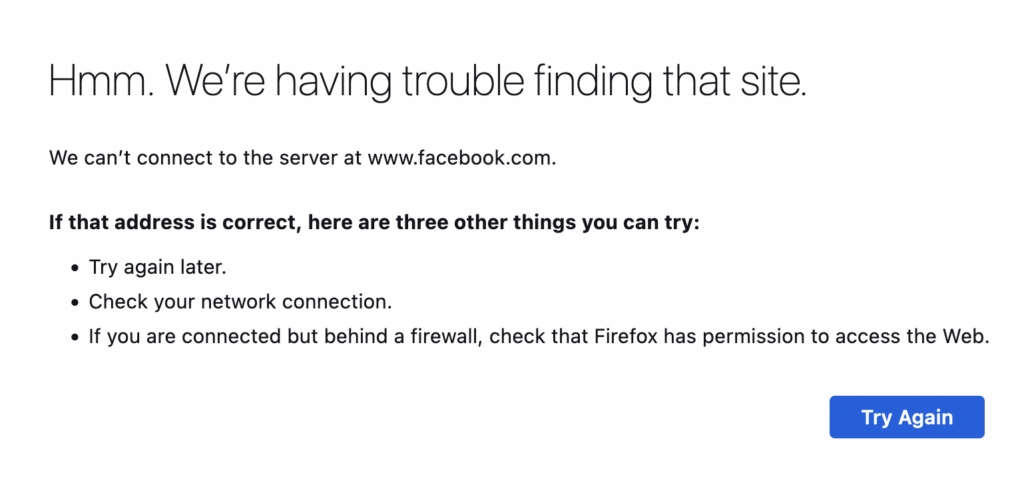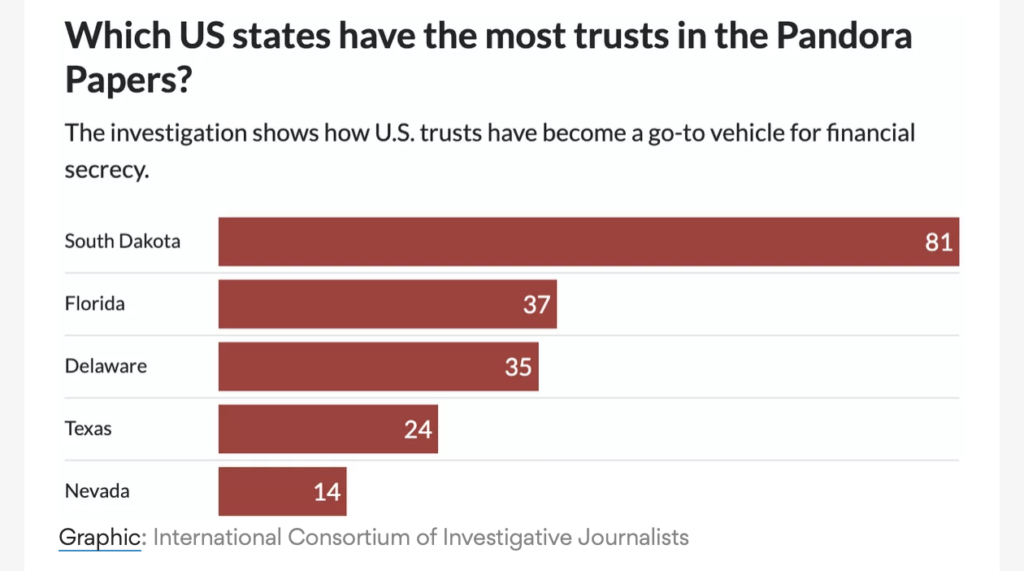The behemoth stumbles

From Krebs on Security
Doug Madory is director of internet analysis at Kentik, a San Francisco-based network monitoring company. Madory said at approximately 11:39 a.m. ET today (15:39 UTC), someone at Facebook caused an update to be made to the company’s Border Gateway Protocol (BGP) records. BGP is a mechanism by which Internet service providers of the world share information about which providers are responsible for routing Internet traffic to which specific groups of Internet addresses.
In simpler terms, sometime this morning Facebook took away the map telling the world’s computers how to find its various online properties. As a result, when one types Facebook.com into a web browser, the browser has no idea where to find Facebook.com, and so returns an error page.
In addition to stranding billions of users, the Facebook outage also has stranded its employees from communicating with one another using their internal Facebook tools. That’s because Facebook’s email and tools are all managed in house and via the same domains that are now stranded.
“Not only are Facebook’s services and apps down for the public, its internal tools and communications platforms, including Workplace, are out as well,” New York Times tech reporter Ryan Mac tweeted. “No one can do any work. Several people I’ve talked to said this is the equivalent of a ‘snow day’ at the company.”
Now comes the interesting bit: The outages came just hours after CBS’s 60 Minutes broadcast a much-anticipated interview with Frances Haugen, the Facebook whistleblower who recently leaked a number of internal Facebook investigations showing the company knew its products were causing mass harm, and that it prioritized profits over taking bolder steps to curtail abuse on its platform — including disinformation and hate speech.
Hmmm…
(And see the Musical Alternative below.)
Quote of the Day
“Mainstream economics is replete with ideas that “everyone knows” to be true, but that are actu- ally arrant nonsense. For example, “everyone knows” that: • Aggregate production functions (and aggregate measures of the capital stock) provide a good way to characterize the economy’s supply side; • Over a sufficiently long span—specifically, one that allows necessary price adjustments to be made—the economy will return to a state of full market clearing; and, • The theory of household choice provides a solid justification for downward-sloping market demand curves.
None of these propositions has any sort of empirical foundation; moreover, each one turns out to be seriously deficient on theoretical grounds.1 Nevertheless, economists continue to rely on these and similar ideas to organize their thinking about real-world economic phenomena. No doubt, one reason why this situation arises is because the economy is a complicated system that is inherently difficult to understand, so propositions like these—even though wrong—are all that saves us from intellectual nihilism.
- Jeremy B. Rudd, Federal Reserve Board, September 23, 2021
Musical alternative to the morning’s radio news
Handel |’Hallelujah Chorus’ from The Messiah | Royal Choral Society
The only suitable way of celebrating the Facebook outage.
Or, if you are of a gentler disposition, try Sheku Kanneh-Mason’s lovely recording of Leonard Cohen’s Hallelujah, arranged by Tom Hodge.
Long Read of the Day
And while we’re on the subject…
Facebook Is an Authoritarian State
Facebook is acting like a hostile foreign power; it’s time we treated it that way, writes Adrienne LaFrance in The Atlantic.
Mark Zuckerberg, unlike Einstein, did not dream up Facebook out of a sense of moral duty, or a zeal for world peace. This summer, the population of Zuckerberg’s supranational regime reached 2.9 billion monthly active users, more humans than live in the world’s two most populous nations—China and India—combined.
To Zuckerberg, Facebook’s founder and CEO, they are citizens of Facebookland. Long ago he conspicuously started calling them “people” instead of “users,” but they are still cogs in an immense social matrix, fleshy morsels of data to satisfy the advertisers that poured $54 billion into Facebook in the first half of 2021 alone—a sum that surpasses the gross domestic products of most nations on Earth.
GDP makes for a telling comparison, not just because it gestures at Facebook’s extraordinary power, but because it helps us see Facebook for what it really is. Facebook is not merely a website, or a platform, or a publisher, or a social network, or an online directory, or a corporation, or a utility. It is all of these things. But Facebook is also, effectively, a hostile foreign power.
An interesting way of viewing the corporation. Thomas Hobbes would have seen it that way too.
Inside the strange world of Peter Thiel
My Observer review of Max Chafkin’s biography of Silicon Valley’s leading contrarian.
Chafkin is a terrific journalist and he has provided a detailed, impeccably researched account of this journey. In a way, The Contrarian is a chronicle of the evolution of a weird personality cult: the Thielverse, whose members, overwhelmingly, young, rightwing single males, worship their hero as someone gifted with godlike prescience and wisdom.
The strange thing is that the record doesn’t really support this hagiographical vision. Thiel isn’t a gifted geek, just someone who is good at spotting an opportunity. His investment record is patchy, although it shows that he has always been good at getting out before the peak. And although he masquerades as a visionary who derides liberal democracy as too slow and stupid to survive, in practice he has devoted much of his career to building businesses that feed off its governments. In that sense, his actual legacy is Palantir, a supposedly omnipotent and omniscient corporation that can do magic with data analytics; in fact, it is a humdrum government contractor like the rest of the aerospace and global consultancy firms. Think of it as Accenture with added halitosis.
The most interesting thought that emerges from Chafkin’s book is that Thiel isn’t really a visionary at all. That’s because he’s defined only by what he’s against – liberal democracy, liberal elites, multiculturalism, and so on. But if you ask what is he for then only one answer can be extracted from this book: he’s for Peter Thiel.
Chart of the Day

This blog is also available as a daily newsletter. If you think this might suit you better why not sign up? One email a day, Monday through Friday, delivered to your inbox at 7am UK time. And it’s free!
